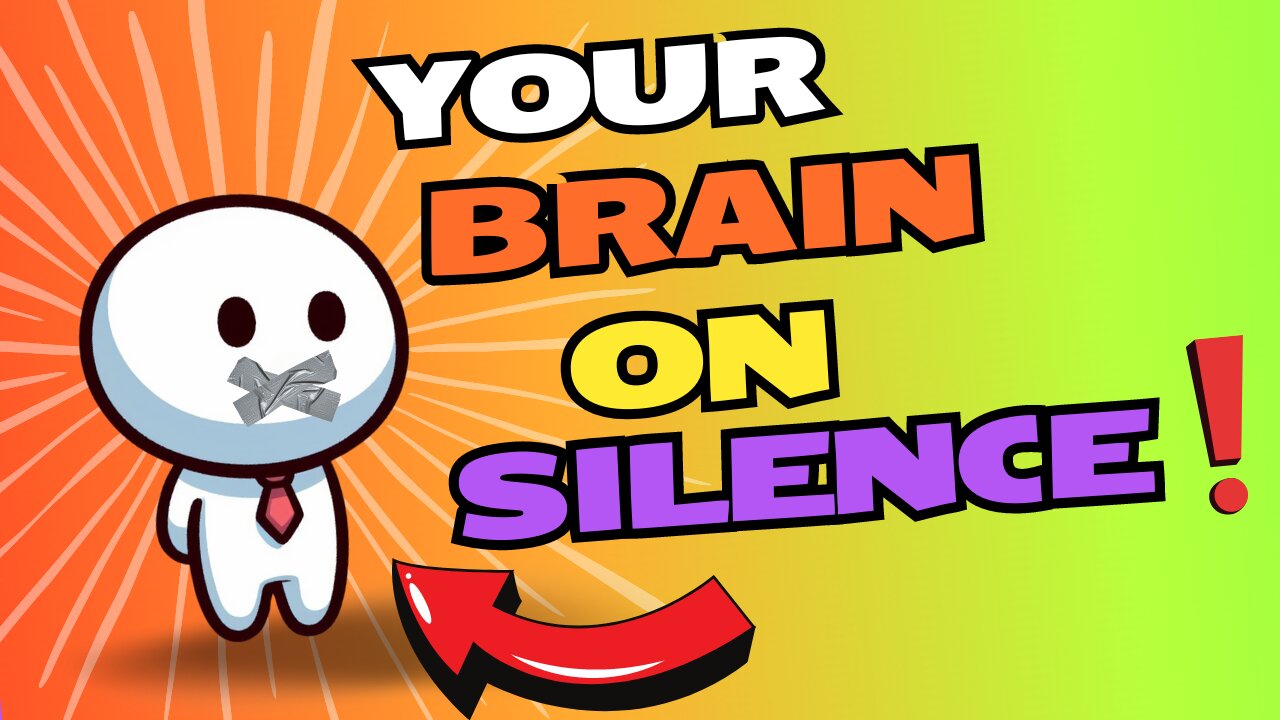Premium Only Content

🤫 Inside the Mind of Quiet Individuals: Unveiling Psychology Facts | ElevatePsychology 🤔
👋 Greetings from @ElevatePsychology! Are you introverted or intrigued by the inner workings of quiet individuals? If so, this video is tailor-made for you. In our latest exploration, we unravel fascinating Psychology Facts About Quiet People, offering a deeper understanding and appreciation for those with a quieter demeanor.
🔍 What You'll Discover:
1. 🧠 The Intricate Psychology Behind Quietness
2. 🌱 The Strengths and Traits of Quiet Individuals
3. 🌐 Navigating the World of Introversion
4. 💬 Bridging Communication Gaps Between Introverts and Extroverts
5. 🤝 Actionable Tips for Improved Understanding
📖 Fostering Understanding and Empathy: Our mission is to bridge the gap between introverts and extroverts, fostering a sense of understanding and empathy. Whether you're a quiet person seeking validation or an extrovert eager to comprehend the quiet individuals in your life, this video is packed with valuable insights and actionable tips.
🚀 Why Watch?
• 🌈 Deepen Your Understanding of Quietness
• 🤔 Gain Insights into Psychology Facts
• 🌟 Enhance Communication and Appreciation
📌 Connect with ElevatePsychology:
• 💬 Join the Conversation: #QuietPeoplePsychology
#ElevatePsychology #QuietPeoplePsychology #IntrovertTraits #UnderstandingQuietness #EmpathyBuilding #SubscribeNow
🙏 Deepen your appreciation for quiet individuals! If this video resonates with you, share and like it. Let's foster a world of understanding and empathy between introverts and extroverts.
REFERENCES
Myers, S. (2000). Empathic Listening: Reports on the Experience of being Heard. Journal of Humanistic Psychology, 40(2), 148–173. doi.org/10.1177/0022167800402004
Laney, M. O. (2002). The introvert advantage: How quiet people can thrive in an extrovert world. Workman Publishing.
Feist, Gregory. (2010). The function of personality in creativity: The nature and nurture of the creative personality. Cambridge handbook of creativity. 113-130. 10.1017/CBO9780511763205.009.
Saklofske, D. H., & Kostura, D. D. (1990). Extraversion-introversion and intelligence. Personality and Individual Differences, 11(6), 547-551.
Naude, T. (2007) The relationship between personality and creativity: A psychometric study. Dissertation.
Aguilar-Alonso, A. (1996). Personality and creativity. Personality and individual differences, 21(6), 959-969.
Nobel, C. (2010). Introverts: The best leaders for proactive employees. Harvard Business School Working Knowledge, 4, 1-2.
Zelenski, John & Sobocko, Karin & Whelan, Deanna. (2014). Introversion, Solitude, and Subjective Well-Being. 10.1002/9781118427378.ch11.
Morin, A., & Everett, J. (1990). Inner speech as a mediator of self-awareness, self-consciousness, and self-knowledge: An hypothesis. New ideas in psychology, 8(3), 337-356.
Valerie Manusov, Daniel Stofleth, Jacquelyn A. Harvey & John P. Crowley (2020) Conditions and Consequences of Listening Well for Interpersonal Relationships: Modeling Active-Empathic Listening, Social-Emotional Skills, Trait Mindfulness, and Relational Quality, International Journal of Listening, 34:2, 110-126, DOI: 10.1080/10904018.2018.1507745
-
 6:32:18
6:32:18
MattMorseTV
7 hours ago $25.32 earned🔴Trump's meeting with Zelenskyy - LIVE🔴
92K69 -
 1:09:56
1:09:56
Kim Iversen
2 hours agoTrump Floats Sending U.S. Troops To Ukraine | Bill And Hillary Clinton Questioned Over Epstein Files
41.7K49 -
 LIVE
LIVE
GritsGG
9 hours agoWin Streaking! Most Wins 3390+ 🧠
161 watching -
 LIVE
LIVE
StoneMountain64
6 hours agoBattlefield 6 Roundup, and NEW MAP for Battlefield 2042 on the Road to BF6
232 watching -
 LIVE
LIVE
Spartan
2 hours agoOctopath 2 into Halo Infinite Ranked (Playing OP2 during infinite ranked queues, pun intended)
53 watching -
 1:20:47
1:20:47
vivafrei
4 hours agoMedia Fears Trump Will "Bully? Zelensky? Newsom Incriminating Himself Over Florida Crash? & MORE!
109K96 -
 LIVE
LIVE
GrimmHollywood
20 hours ago🔴LIVE • GRIMM HOLLYWOOD • BRRRAP PACK • THE FINALS RANKED GRIND •
36 watching -
 LIVE
LIVE
FusedAegisTV
4 hours agoCarpe Diem, Memento Mori | Persona 5 Royal *Epilogue* Episode 3.1
38 watching -
 4:51:42
4:51:42
Dr Disrespect
7 hours ago🔴LIVE - DR DISRESPECT - IMPOSSIBLE TRIPLE THREAT CHALLENGE 2025 - WARZONE, FORTNITE, THE FINALS WINS
124K17 -
 1:34
1:34
robbijan
3 hours agoComing soon.. Robbi On The Record
25.6K15